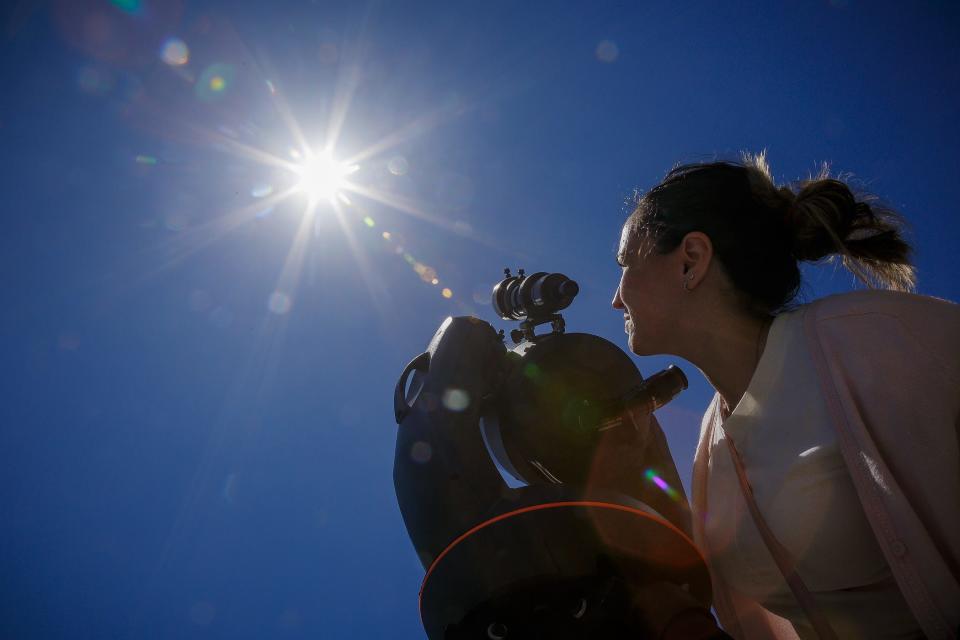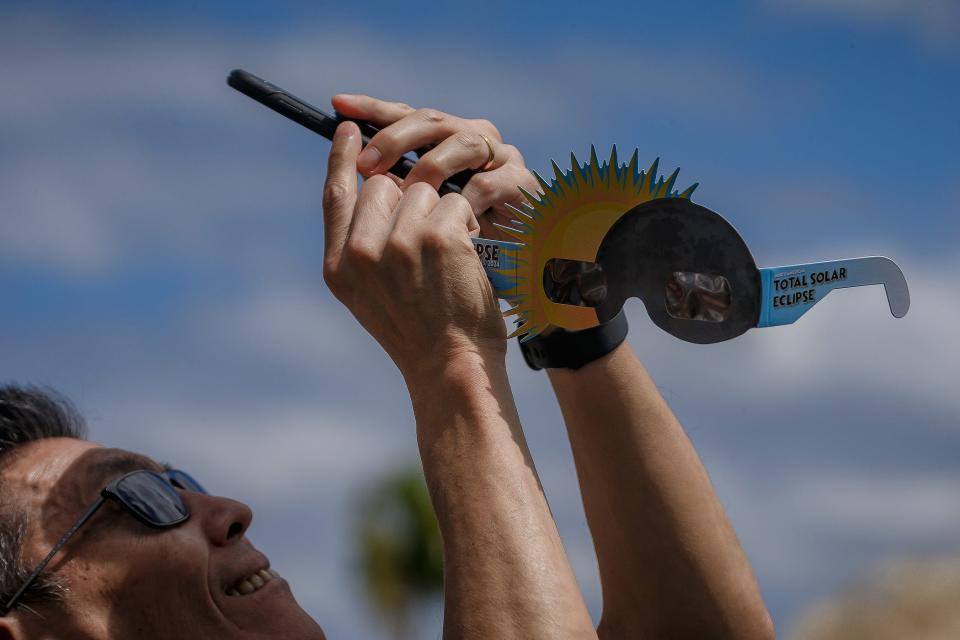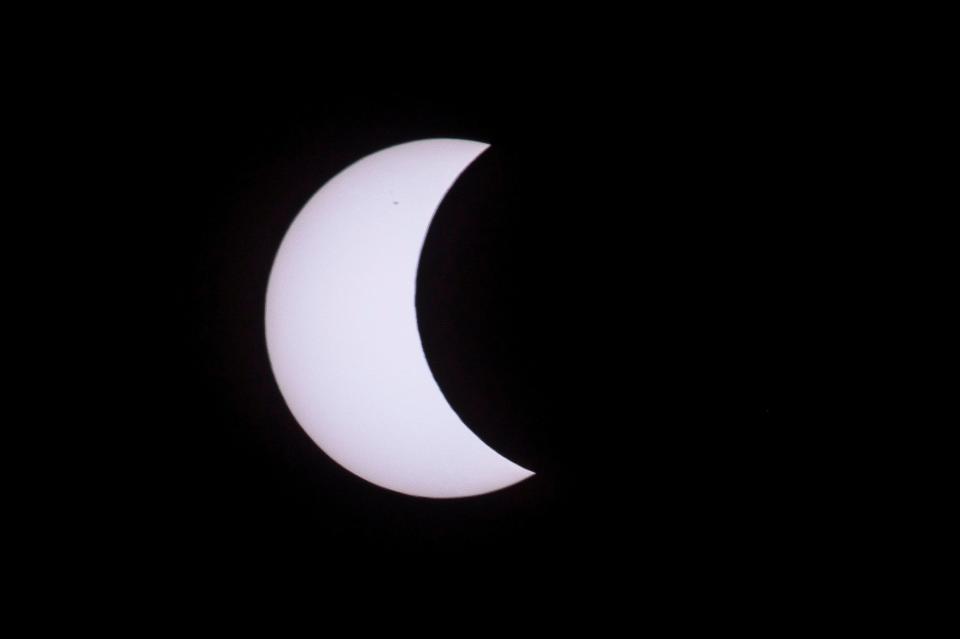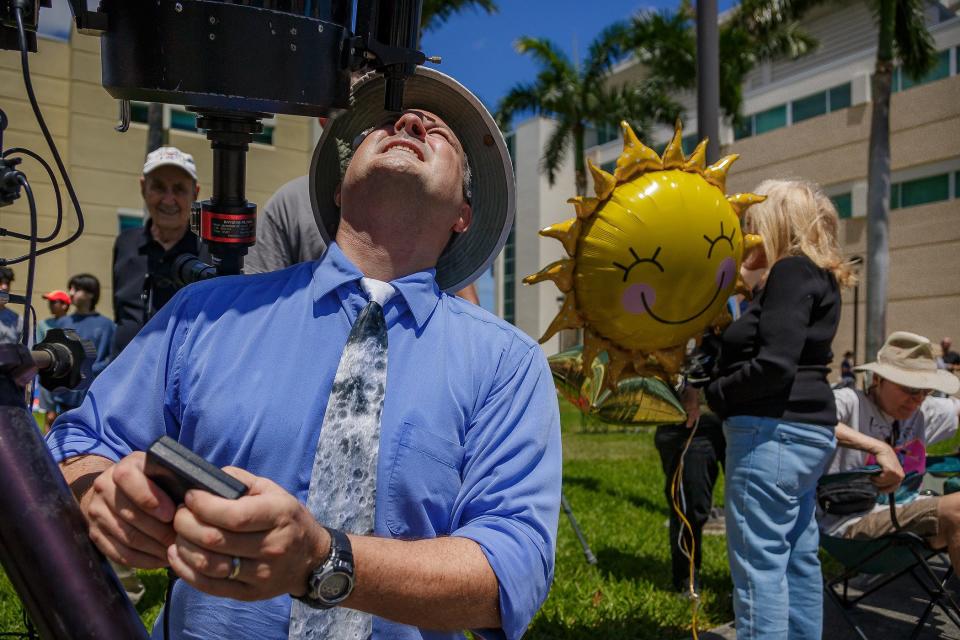Partial solar eclipse in Palm Beach County wowed viewers between passing clouds
South Floridians paused in unity Monday to view a rare cosmic showstopper as a partial solar eclipse darkened nearly half of the sun in a sky of fleeting cumulus clouds.
While the tip of the Peninsula was far from the 115-mile wide path of totality, which painted a dark specter from Texas through Maine, the image of Earth’s only natural satellite blotting out the lifegiving star was still an exceptional sight.
"It really humbles us as humans," said Marc Wiscoff, senior technology advisor and adjunct curator at the Marmot Observatory at the Cox Science Center and Aquarium in West Palm Beach. "It's something which is just an incredible phenomenon, and if you can experience it in a group, it has a cohesiveness showing the amazing power of nature."
From the Marmot Observatory to West Palm Beach City Hall to Florida Atlantic University in Boca Raton and Mirasol Park in Palm Beach Gardens, thousands stopped to look up with solar eclipse glasses, or look down as strange shadows were cast on the ground.

Ten minutes into the event at the Marmot Observatory, stubborn clouds meandered overhead. But a patch of blue soon appeared.
"Wow! I see it!" a woman said in a gasp.

The last total solar eclipse in the U.S. was in 2017. The next total solar eclipse that crosses the country won’t be until Aug. 12, 2045, but its path from Northern California through Florida will put most of the Sunshine State in the path of totality.

In Palm Beach County, about 50% of the sun was covered Monday. Toddlers to octogenarians lined up at the science center to get eclipse glasses and watch the event as seen by the observatory's 10-inch refraction telescope ― the largest public telescope in South Florida.
Khrissy Hopkins brought her 3-year-old son. He thought he was going to see the dinosaurs at the center, but she wanted him to see the eclipse because of the experience she had in totality in 1995 in the Philippines.
"It was so dark and the temperature dropped," Hopkins said. "It was amazing. I vividly remember it. I want him to experience it."

A celestial watch party crowd gathered in the courtyard behind the city library near West Palm Beach City Hall.
Phil Growick came out to see the eclipse with his wife, Maiju Growick.
"Everybody in the world is thinking about it," she said of the eclipse. "Things like this bring people together. I think we need to come up with an artificial eclipse once a week."
As the Growicks spoke, a line formed behind the telescope Stephen Schiff brought to the courtyard.
Schiff is a planetary educator in Boynton Beach and a member of the Astronomical Society of the Palm Beaches.
Schiff brought his telescope to let people safely view the partial eclipse.
"The black is the moon?" a woman asked excitedly.
Yes, it is," Schiff said.
As the next person took their turn, Schiff said the eclipse is special.
"This is a lifetime-changing event," he said. "Everyone should see it at least once."
At Saint Andrew’s School in Boca Raton, more than 1,000 students and staff took to the football field to gaze up at the sun.
Emmanuel Bravo, 14, stood in line with dozens of others to look through a telescope focused on the sun and filtered for eye safety. Bravo was fresh off a trip to Cape Canaveral for spring break where he hoped to see the launch of the Delta IV Heavy rocket. Unfortunately, the rocket never took off while he visited (it's scheduled to launch Tuesday, April 9), but seeing the eclipse with all his friends made him “ecstatic,” he said.
“I’ve loved space since I was a kid, and it’s just so much fun to think about how rare eclipses are,” Bravo said.
He’s also used this week to think about the next solar eclipse with a path of totality across the lower 48 states, which will be in the summer of 2045.
“The high school class graduating that year hasn’t even been born yet,” Bravo reflected.
At a family event at Mirasol Park, Rob Stickle took his 12-year-old daughter — who owns a collection of NASA t-shirts — to the event because she is a big fan of astronomy and couldn’t wait to see the eclipse.
“The eclipse makes you realize where you are, how big the universe is, how small we are, and how awesome nature is,” said Stickle, 52.
He noted that society has come a long way from hundreds of years ago when an eclipse was viewed as a bad omen. For Stickle, it has the opposite meaning.
“It’s a very positive thing for me because I get to have this cool experience with my daughter,” Stickle said. “I wasn’t super-excited about it until she got excited about it, and now it's a father-daughter thing.”
At 3:07 p.m., the crowd broke into a roaring applause. One yelled “It’s happening!” as the clouds parted, giving residents a pristine view of the eclipse.
Palm Beach Post staff reporters Wayne Washington, Kati Kokal and Maya Washburn, and Post photographers Greg Lovett and Thomas Cordy contributed to this report.
Kimberly Miller is a veteran journalist for The Palm Beach Post, part of the USA Today Network of Florida. She covers real estate and how growth affects South Florida's environment. Subscribe to The Dirt for a weekly real estate roundup. If you have news tips, please send them to kmiller@pbpost.com. Help support our local journalism, subscribe today.
This article originally appeared on Palm Beach Post: Partial solar eclipse in Palm Beach County wows viewers between clouds.

